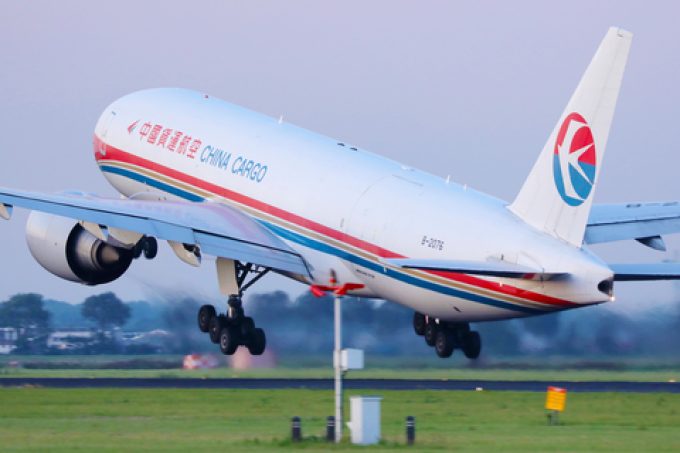US 'de minimis' rises its head again as shipments hit a billion a year
When a helicopter has been broken down and shipped in parts under the US de ...
BA: WIND OF CHANGEMAERSK: BULLISH CALLXPO: HEDGE FUNDS ENGINEF: CHOPPING BOARDWTC: NEW RECORDZIM: BALANCE SHEET IN CHECKZIM: SURGING TGT: INVENTORY WATCHTGT: BIG EARNINGS MISSWMT: GENERAL MERCHANDISEWMT: AUTOMATIONWMT: MARGINS AND INVENTORYWMT: ECOMM LOSSESWMT: ECOMM BOOMWMT: RESILIENCEWMT: INVENTORY WATCH
BA: WIND OF CHANGEMAERSK: BULLISH CALLXPO: HEDGE FUNDS ENGINEF: CHOPPING BOARDWTC: NEW RECORDZIM: BALANCE SHEET IN CHECKZIM: SURGING TGT: INVENTORY WATCHTGT: BIG EARNINGS MISSWMT: GENERAL MERCHANDISEWMT: AUTOMATIONWMT: MARGINS AND INVENTORYWMT: ECOMM LOSSESWMT: ECOMM BOOMWMT: RESILIENCEWMT: INVENTORY WATCH

Airlines are boosting their transpacific capacity in the face of continued strong ecommerce volumes.
Etihad Cargo said today it was increasing its presence in the US. It currently offers 500 tonnes of capacity to North America each week, but is introducing another 250 tonnes, with flights to New York, Chicago, Washington, Boston and Toronto, with connections via European gateways including Lisbon, Barcelona, Madrid and Rome, in partnership with network airlines.
The carrier said: “To address the growing demand to the US, Etihad Cargo will offer incremental capacity beyond its belly hold capacity via 30 passenger flights per week to the US and seven passenger flights per week to Canada, demonstrating the carrier’s commitment to facilitating increased air freight between the East and West.”
Transpacific air freight traffic is currently dominated by ecommerce, with reports it is accounting for up to 60% of volumes.
China Cargo Airlines is also is also looking to boost transpacific capacity: it has announced a new hard block space agreement with fellow SkyTeam Cargo member AF-KLM Cargo for 1 July that will allow the carrier to use Air France’s belly capacity from Charles de Gaulle to São Paulo Guarulhos Airport.
AF-KLM and China Cargo Airlines have collaborated for a decade, with joint handling at Shanghai Pudong carried out by the Chinese airline.
Wang Jianmin, president of China Cargo Airlines, said: “In the face of increasing challenges in the air cargo market, we are committed to building stronger and deeper partnerships. This step with Air France KLM Martinair Cargo is a significant move towards expanding our aviation network and enhancing our air logistics market.”
Research and Markets this week said Brazil’s ecommerce market was forecast to reach $87.6bn by 2028, and added: “As China’s ecommerce entities look to extend their influence, Brazil’s burgeoning market presents lucrative opportunities.”
And this week Chinese cross-border ecommerce platform AliExpress announced a strategic partnership with Brazilian ecommerce leader Magazine Luiza to sell AliExpress’s Choice range of products.
Meanwhile, Challenge Group yesterday signed an MoU with Zhengzhou Airport (CGO), to set up a strategic partnership with China Henan Aviation, the holding company controlling CGO. Challenge said that it would look to increase frequencies at CGO, develop a multimodal hub there to boost ecommerce traffic, and enhance road feeder services and rail links.
There have been growing fears over ecommerce, however, with heightened scrutiny from the US on imports, and growing concerns from European manufacturers, as reported today by The Loadstar, as well as a focus on Challenge’s EU hub, Liege.
FedEx dodged a question in this week’s earnings call from Stifel analyst Bruce Chan on ecommerce. He asked management to evaluate the risk to FedEx of tariffs on ecommerce. Chief customer officer Brie Carere pointed to FedEx’s “diversified base” of customers, but admitted that “ecommerce is the largest driver of intercontinental out of China”.
Adding: “No one carrier can serve [Chinese platforms’] entire needs, and I think we have found a very productive and profitable relationship.”
CEO Raj Subramaniam added that FedEx’s global presence meant it would just adapt to any new market conditions, but he failed to mention any potential risk from a US crackdown on Chinese ecommerce imports.
Meanwhile, in its latest reorganisation and cost-cutting drive, FedEx has retired 22 757 aircraft from its US network.
And, as it announced adjusted net income for its full year of $1.34bn, up from $1.25bn a year earlier, it also said it had planned cost savings for fiscal 2025 of $2.2bn. FedEx said it had already taken out$1.8bn in structural costs in FY24, cutting $500m from its air network.
“Our fourth-quarter results include a non-cash impairment charge of $157m relating to our decision to permanently retire 22 Boeing 757 aircraft from our US domestic network, along with seven related engines,” explained CFO John Dietrich.
“These actions, coupled with the previously announced retirement of nine MD-11s in the quarter, resulted in the permanent removal of 31 jet aircraft from our fleet in FY24.”
He added that the staff cuts announced earlier this month in Europe would see $125m to $175m in annualised benefits beginning in FY27.
“Decisions like these are never easy, but are a necessary step to improve profitability in the region,” he said.
Comment on this article